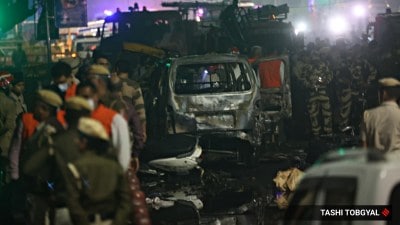Hub-and-Spoke Model: Tata Memorial Hospital’s proposal to combat rising cancer epidemic in India
To address the issue, the hospital has proposed a solution to the central government: the hub-and-spoke model across India.
 The hospital's new director revealed a daunting projection: India's current cancer caseload of 13 lakh is anticipated to double within the next 5 years, emphasising the urgent need for strategic healthcare interventions.
The hospital's new director revealed a daunting projection: India's current cancer caseload of 13 lakh is anticipated to double within the next 5 years, emphasising the urgent need for strategic healthcare interventions.India’s cancer rates are surging. Mumbai’s Tata Memorial Hospital — the nation’s largest cancer hospital alone registers 70,000 new cases yearly. Dr Sudeep Gupta, the new director of the hospital, warns that cases will double in the upcoming years, further widening the treatment gap. To address the issue, the hospital has proposed a solution to the central government: the hub-and-spoke model across India.
The profound impact of cancer is evident as 11 centres of Tata Memorial Centres (TMC) witness 1.25 lakh new cases every year. The hospital’s new director revealed a daunting projection: India’s current cancer caseload of 13 lakh is anticipated to double within the next 5 years, emphasising the urgent need for strategic healthcare interventions.
He outlined that the annual patient footfall at the two cancer centres of TMC has surged to 25,000 new cases per year, emphasising the increasing incidence of cancer.
“We thought that with the establishment of these nine new centres, the patient caseload at Mumbai’s hospital would decline, but that’s not the case. We are still recording 70,000 new cases annually as before,” said Dr Gupta. “This highlights the need to disperse cancer care centres across India—especially in areas with limited health accessibility,” he added.
So, the hospital has submitted a proposal to the central government in following its hub and spoke model. Patients, facing expensive and logistical challenges in traveling long distances for medical care, can access “spokes” for routine care and medication. “Hubs” are reserved for critical situations, reducing overall burden.
“The specialised cancer centre serves as the central “hub” with advanced facilities and a multidisciplinary team like paediatric cancer. While “Spoke” centres handle common cancers like oral, cervical among others along with the routine check-ups, follow-ups, repetitive treatments, and supportive care, ensuring a well-rounded and patient-focused approach to cancer management,” said Dr Gupta.
The hospital has proposed establishing 30 to 40 hubs with specialised facilities, serving a population of five to six crore. Additionally, spoke centres are envisioned to provide cancer care treatment to approximately one crore people, creating a network to address diverse healthcare needs across different population segments.
Indeed, private hospitals with specialized cancer care facilities can also be included.
“We have advised the central government to designate all established AIIMS as hub centres. They simply need to initiate specialised cancer units equipped with facilities like radiology, pathology, medical oncology, transfusion medicine, and multidisciplinary treatment. This way, India can avail specialised cancer care across the nation,” he said.
He said they’re putting the hubs and spoke centres in smart places on the map to make it easier for patients to get there quickly. Three of the 11 hospitals, like Khopoli and Muzaffarpur, will be main hubs, and the other eight will be supporting spoke centres.
“We don’t need 300 hub-and-spoke centres; that would dilute their purpose. Approximately 30-40 hubs are sufficient in areas with limited facilities. Additionally, there is a need for trained healthcare workers,” he said.
With support from the central government, the TMC’s Kharghar centre—ACTREC’s operation theatre has expanded from five to 19. Additionally, a new facility, the ‘Platinum Jubilee Block,’ is underway at the Haffkine Institute campus, covering 11 lakh square feet. State-approved and set for completion by March 2027.
“In 2018, ACTREC had 120 beds, which has now increased to 500 beds. We aim to expand it to 930 beds by the end of 2024 or the beginning of 2025,” he said.
Furthermore, TMH is pioneering research on Ayurvedic treatments for cancer patients. As The Indian Express reported earlier, a new research centre in Khopoli, 45 kilometers from the ACTREC centre, is being established. The initiative involves planting 97 traditional medicinal herbs, and seven clinical trials have already been conducted.







